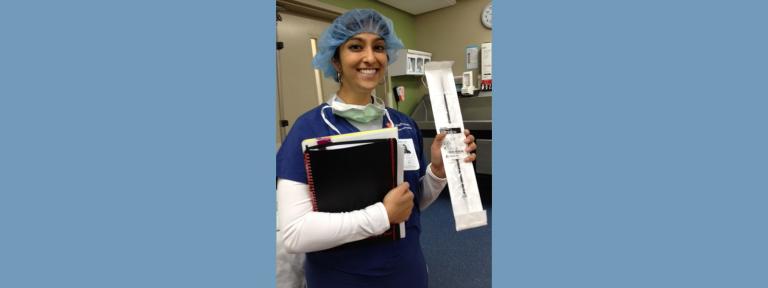
“While testing the device in simulated situations takes us far, there may be tweaks that are required when the product is tested in a real setting by surgeons in an operating room environment.”
Shar Puskala ’01 was the project manager for a team that developed disposable laparoscopic scissors that are compatible with a newly launched take-apart instrument line at CareFusion. Puskala, a Mechanical Engineering graduate, is employed by CareFusion in Chicago designing medical equipment. CareFusion is headquartered in San Diego and operates in more than 150 countries around the world, including a large presence in northern Chicago where Puskala is based.
The disposable laparoscopic scissors are currently in a limited market release. “We have released the scissors to a limited number of surgeons, so they can use the product and provide feedback prior to full market release,” said Puskala.
“While testing the device in simulated situations takes us far, there may be tweaks that are required when the product is tested in a real setting by surgeons in an operating room environment,” she explained. “So our company chooses to perform limited market releases on certain products to ensure we have met the end-customers’ requirements.” Puskala said that if the surgical tests go well, CareFusion will fully release the product.
The laparoscopic scissors project took Puskala two years to develop and had special meaning for her because they are the same type of scissors that would have been used to cut the cystic duct in a laparoscopic cholesysectomy (gall bladder removal surgery) that her mother had a few years ago.
The patient benefit of these scissors is that they are electrosurgical, so having a disposable shaft provides a fresh insulation and sharp scissors with every use, according to Puskala. Each instrument is inspected prior to sale to ensure that the scissors cut both electrosurgically (through high-frequency monopolar energy) and mechanically. The scissor tips themselves can cut through a variety of tissues.
Additionally, the scissors extend the company’s take-apart platform, which is easy to assemble and disassemble, and provides visual confirmation to help ensure the instrument is clean, according to Puskala.
This is especially important because hospital acquired infections (HAIs) are an expensive cost to healthcare, and taking the instrument apart for cleaning, or disposing pieces of it, helps reduce the risk of cross-contamination from patient to patient. Additionally, the ergonomic handle reduces the stress on the surgeons’ hands, which is a benefit during long procedures.
“Interestingly, the polyolefin material used as insulation for our scissors is the same material that is universally used as insulation for wires for electricity. This insulation, prior to being implemented in this design, was tested to ensure biocompatibility,” said Puskala.
“Because these scissors are disposable, our challenge was that we had to do a lot of research to determine what was required for one full surgery, while balancing over-design, which can lead to higher costs,” said Puskala. “That means we had to walk a fine line between reliability for the entire surgery and over-performance, which can drive up costs,” she added.
This required heavy research through watching a lot of surgeries, as well as interacting with the customer to ensure the scissors being developed met customer needs, but didn't have too many features that were not considered valuable to the customer.
CareFusion’s vision is to improve the safety and lower the cost of healthcare for generations to come. .
In addition to being an alumna, Puskala’s ties to Kettering, where her father, Dr. Raghu Echempati is a professor of Mechanical Engineering, include serving on the Kettering Mechanical Engineering Department Industrial Advisory Board.